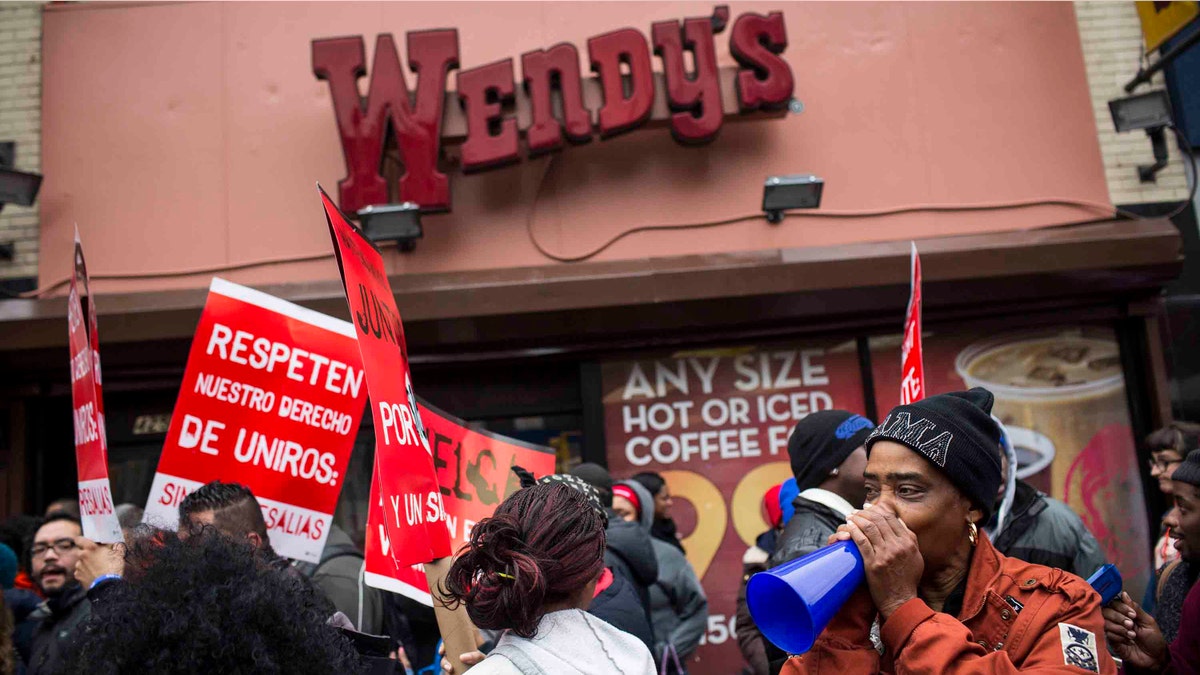
NEW YORK, NY - DECEMBER 05: Protesters rally outside of a Wendy's in support of raising fast food wages from $7.25 per hour to $15.00 per hour on December 5, 2013 in the Brooklyn borough of New York City. A growing number of fast food workers in the United States have been staging protests outside restaurants, calling for a raise in wages, claiming it is impossible to live resonably while earning minimum wage. (Photo by Andrew Burton/Getty Images) (2013 Getty Images)
At Tuesday night’s State of the Union address, President Barack Obama was expected to announce that he would sign an executive order increasing the minimum wage from $7.25 to $10.10 for new federal contracts.
There is fierce disagreement over the effects of such a change, and many are voicing their concerns in the hours before the president’s speech.
An increase would certainly be welcome among Hispanics workers, who earn the minimum wage or below in disproportionate numbers —20.2 percent in 2012, according to the Bureau of Labor Statistics.
On the other hand, there have been plenty of academic studies that show that increases in the minimum wage bring about overall reductions in employment. In the mid-2000s, David Neumark and William Wascher at the National Bureau of Economic Research conducted a survey of 100 studies on the topic and concluded that “the preponderance of the evidence points to unemployment effects.” With people at the lower end of the wage scale suffer those losses more frequently.
Michael Hicks, the director of the Center for Business and Economic Research at Ball State University in Indiana, estimated that federal minimum-wage increases in 2007, 2008 and 2009 cost the state of Indiana 550,000 part-time jobs.
Carli Dimino, a policy advocate at the LIBRE Initiative – a conservative nonprofit Latino advocacy organization – wrote Tuesday on Forbes, “Of all demographic groups, Hispanics are forced into part-time labor at a higher rate than any other, and … Latino entrepreneurs start businesses at a rate that is twice the national average. The president’s proposal to increase the federal minimum wage will adversely impact both groups.”
Another consideration in the argument is the presence in many states – such as Texas, where 12.7 percent of all laborers are paid the minimum wage – of undocumented immigrants, who often are willing or made to get paid sub-minimum compensation.
But when California Governor Jerry Brown signed into law a $2 per hour hike in the state’s minimum wage last September, a number of Latino and white voices hailed the move.
For the 925,000 Californians affected, the hike translated into a $4,000 a year raise for full-time workers.
"A higher minimum wage will mean much-needed money in the pockets of millions of workers in the state, and that's good news for businesses throughout California," Gary Gerber, founder and CEO of Sun Light & Power in Berkeley, said back then.
Follow us on twitter.com/foxnewslatino
Like us at facebook.com/foxnewslatino
